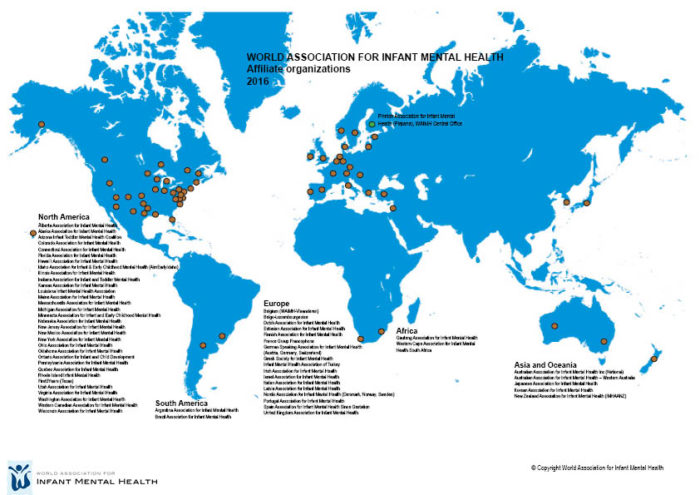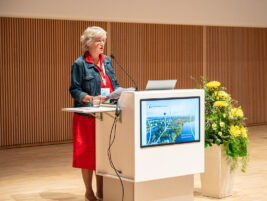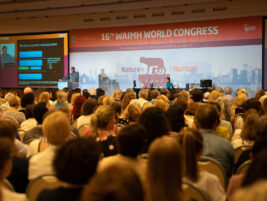In parallel to the on-going creation of new WAIMH Affiliates, the question of the role that members of infant mental health associations, particularly clinicians, might play in influencing their own country’s health policies, besides being a forum for scientific and clinical exchange, is becoming central. In that context, this issue of Perspectives is extremely relevant and valuable.
Of particular interest is the excerpt from the FrameWorks Institute whose authors, Nathaniel Kendall-Taylor and Michael Baran, describe their interesting study based on interviews conducted with health policy makers. Their aim is to identify and describe the implicit assumptions that policy leaders have about children’s issues generally and early child development (ECD) more specifically. The assumptions can be seen as the cognitive “filters” through which key scientific messages may be interpreted and misinterpreted. The authors have identified several main assumptions that may explain the scarcity of means allocated to infant mental health in many countries of the world. For example, the idea that early development is important, but survival is more important or that development is a “natural” process that “just happens” as long as the basic safety of a child is secured. Similarly, ECD is seen as important across the field, but at the same time, is not seen as its own stand-alone concept. Last but not least, physical growth and health are the “what” that develops during development. These assumptions explain the dominant focus among policy makers regarding nutritional programs as the main target of intervention.
I would suggest adding to this conceptualization of health policy makers’ attitudes, an emotional, even more implicit and less conscious aspect. The subjects of early child development and mental health evoke powerful and sometimes painful childhood memories in all adults. We often encounter emotional attitudes of judges and attorneys in family disputes…when the best interest of the child is in conflict with the parents’ interests. Similarly, the preference for foster families over group homes and orphanages also comes from the implicit, emotional, and very strong assumption that a family, regardless of its level of functioning, is better than a good, attachment-oriented institution. As a consequence, the scientific finding that simply placing a child in foster or family based care does not ensure quality or protection of the child, is most often overlooked.
Still, there are instances of the significant impact of science on social laws. For instance, the accumulated research about a father’s role in early child development and his capacity to build an attachment relationship as secure as the relationship between a young child and his or her mother, has led to radical changes in custody laws in many countries, including England, Australia, Belgium, Denmark, New Zealand, and more. By coincidence, on this very week-end, I found in one of the major Israeli daily newspapers a long article about the intention of the government to change the law that has been established since the creation of the state, according to which mothers are “automatic” custodians of the child in the first six years of life in high-conflict cases. The debate has been extremely emotional and has lasted for several years, ending with the compromise of default maternal guardianship until the age of two years.
The dynamic interplay between societal health policies and scientific data about the infant’s competencies and brain development, is also the rationale of the effort WAIMH has been currently making to compose an Infant’s Rights Statement. We have sent you a first Draft, and your feedback can really make a difference in the end-result!
Besides all of these things, we have been very busy at improving the visibility of WAIMH among other mental health associations. For instance, board members participated in a symposium and plenary at the Asian Association for Child and Adolescent Psychiatry last September. Members will again participate in the next World Psychiatry Association Pediatric Section and a plenary lecture at the Association of Early Psychopathology in Brussels. Central Office staff and members participated in the Australian Association for Infant Mental Health Conference in Canberra and in the Four Winds Conference in Japan, both this past November. Finally, we are continuing to work on creating a Social Media Network for all our members and Affiliates.
Of additional importance, many thanks to those of you who have responded to the survey regarding the revision of DC 0-3R. Your comments are extremely valuable and helpful, mainly because they are the result of clinical work in the real world!
Last, but not least, the preparation for our Edinburgh Conference is going smoothly, thanks to the Local Committee team and the EC Conference Organizer. Abstracts have been reviewed and acceptance letters will be sent in the near future.
Warmly to all of you,
Miri Keren, WAIMH President
Vol. 21 No.4 Winter 2013 – President’s Reflections
Authors
Keren, Miri,
WAIMH president,
Israel








